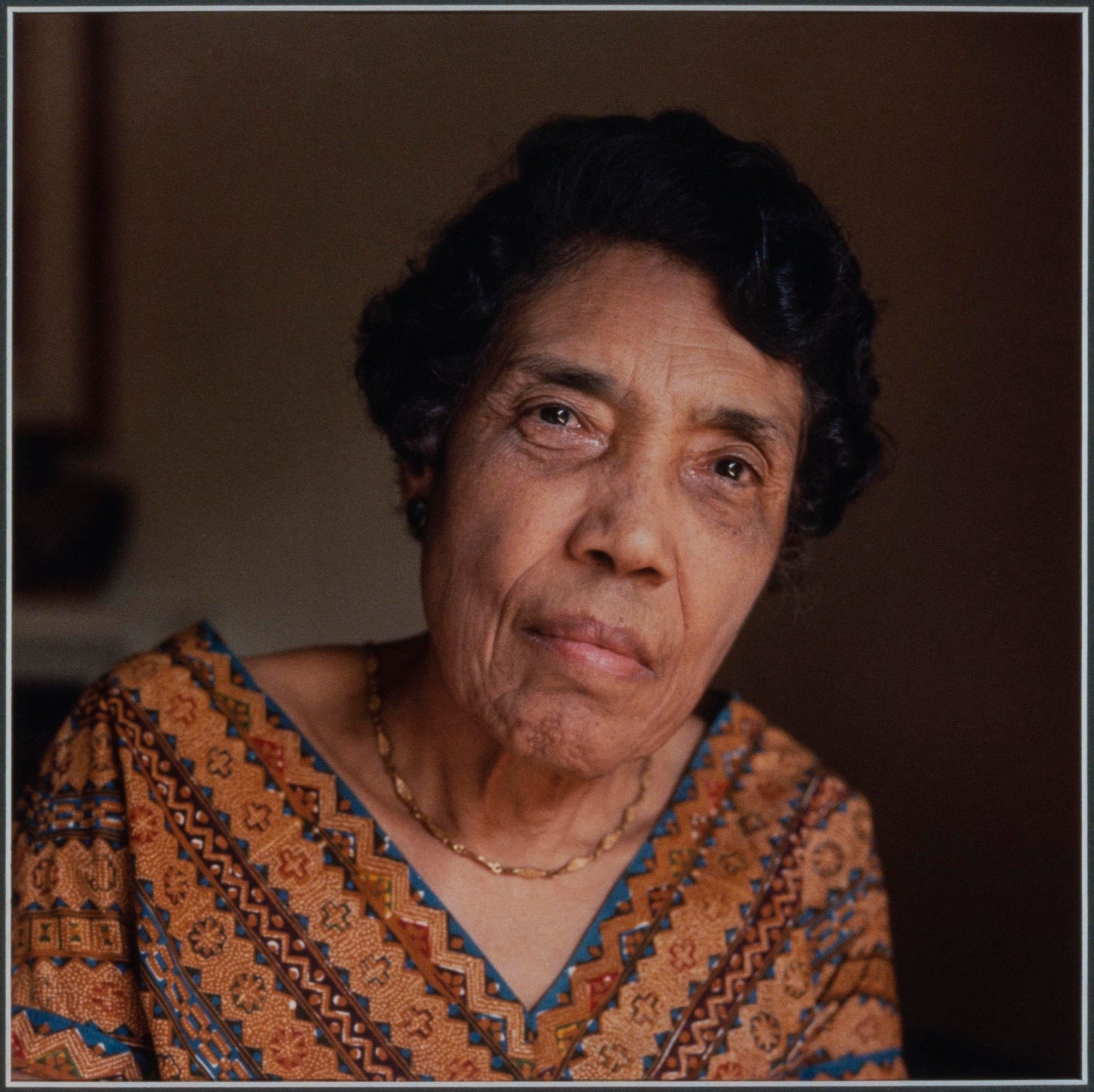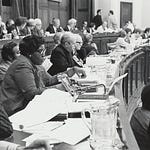
You just heard an anthem sung by members of the Merze Tate Explorers, a non-profit, grassroots organization founded in 2008 for girls in the sixth through twelfth grade. Like other youth groups embedded in communities of color, the organization introduces girls to mentors, exposes them to career and college opportunities and, most importantly, funds travel and study abroad that wealthier students may take for granted. Merze Tate Explorers was founded by reporter Sonya Bernard-Hollins, who became aware of historian and international relations expert Vernie Merze Tate when she was researching a series of articles about prominent African American graduates of Western Michigan University.
But maybe you are asking—who is Merze Tate?
I’m not surprised if you have never heard of her: I hadn’t before a few weeks ago. Despite Tate’s prominence in her own time, I was never assigned her work in graduate school, nor was I aware of the substantial impact she made to the histories of international relations and American foreign policy. Tate was born into a rural African American family in Michigan in 1905. Growing up in a majority white community, she was one of a few notable figures (another is W.E.B. DuBois) who moved from a desegregated environment to a segregated one as her educational accomplishments propelled her to Western Michigan University, then Western Michigan Teachers College. Tate was the school’s first African American graduate, and after commencement, she took a teaching position at the prestigious Crispus Attucks High Schoolin Indianapolis. There, she did something no other teacher had done, and that was difficult to navigate in a racially segregated country: Tate started a travel club and took a group of Black students to the nation’s capital.
The theme of Merze Tate’s life was travel. This was true in the literal sense—she visited numerous countries on all but two of the world’s continents—and it was also metaphorical, since over several decades, she went from being an ambitious, small-town girl to a cosmopolitan citizen of the world. Tate charted her path as an intellectual and fought for her dreams in a skilled, self-confident style that would equal one of today’s students from any race, gender, or class. She earned a master’s degree from Columbia University, then won scholarships that took her to Oxford University as the first African American woman to earn the B.Litt. there, and to Harvard University, for a Ph.D. in international relations.
Along the way, Tate won her first college teaching job at Bennett, a four-year liberal arts college for Black women in Greensboro, North Carolina, and a second job at Morgan State University in Baltimore. Then, in 1942, Tate became the first African American woman to be appointed to the history department of Howard University in Washington, D.C., still known by its students and alumni as “The Mecca,” and the national capital of Black intellectual life.
Tate spent the rest of her career at Howard—that is, the time she wasn’t spending on ships, planes, and trains traveling around the world, doing research, and hobnobbing with world leaders, and knitting together a global network of Black intellectuals and policymakers. Oh yes—and writing five books, as well as hundreds of scholarly and general audience articles and essays, taking breaks in the evening to host and attend dinner parties and bridge tournaments.
If achievement is one theme of Tate’s life, being in motion is another. Travel was not just a pleasure, or work. It was central to how she carved out a prominent place in the firmament of twentieth century intellectual life. Travel defined Tate’s proudly independent existence. “We’re on our way, becoming who we are,” the Explorers sing in the clip that opened this segment. “We’re going to live—live the way we want to.” Traveling as a single, Black woman—Tate never married and remained unpartnered—was a challenge, even for a woman who spoke multiple languages. But Tate thrived on these adventures, believed in herself, cultivated global networks of friends, mustered support for her aspirations, and to quote the Explorers, lived the way she wanted to, even when it meant overcoming disapproval, rejection, or prejudice.
Tate’s was an extraordinary life, so I wanted to bring her biographer to the show. Historian Barbara D. Savage is Geraldine R. Segal Professor Emerita of American Social Thought in the Africana Studies department at the University of Pennsylvania. She is the author of two previous prizewinning books, Your Spirits Walk Beside Us: The Politics of Black Religion (Harvard University Press, 2008), and Broadcasting Freedom: Radio, War, and the Politics of Race, 1938-1948 (University of North Carolina Press, 1999), and a co-editor, with Mia Bay, Farah J. Griffin, and Martha S. Jones, of Toward an Intellectual History of Black Women (UNC Press, 2015.) In Merze Tate: The Global Odyssey of a Black Woman Scholar (Yale University Press, 2023), Savage skillfully returns this path-breaking intellectual to the distinguished place in American history that she deserves.
Show notes:
Barbara notes her longterm intellectual connection with the archives at Howard University. The collections are held at the Moorland-Spingarn Research Center.
Barbara mentions the Homestead Act of 1862, which brought the Tate family to Michigan. If you want to know ore about the complicated legacy of this legislation, you may wish to read Richard Edwards, Jacob K. Friefeld, and Rebecca S. Wingo, Homesteading the Plains: Toward a New History (University of Nebraska Press, 2019.)
Barbara notes that the history of the American Midwest, and the history of Black people there, is understudied, but she points us to the excellent work of African American historian Darlene Clark Hine.
When she got to Washington, Merze Tate joined the Alpha Kappa Alpha sorority, founded in 1908 by Ethel Hedgemon to forward the interests of Black women. You can read more about AKA here, and learn about the role of the sorority system from Paula Giddings, In Search of Sisterhood: Delta Sigma Theta and the Challenge of the Black Sorority Movement (William Morrow, 1988.)
Women were only admitted to Oxford University as degree students in 1920, a little more than a decade after Tate arrived there to study. You can read more about that history here.
Barbara puts Tate’s outreach to others in the larger context of early 20th century Black elites’ commitment to uplift. You can learn more about this in Kevin Gaines, Uplifting the Race: Black Leadership, Politics, and Culture in the Twentieth Century (University of North Carolina Press, 1996.)
You can download this podcast here or subscribe for free on Apple iTunes, Spotify, Google Podcasts, or Soundcloud. And if you liked this episode, please join us at Political Junkie!
If you enjoyed this episode, why not try:
Episode 37, Black Resistance, Black Joy: A conversation with political theorist Christopher Paul Harris about his book, "To Build a Black Future: The Radical Politics of Joy, Pain, and Care."
Episode 32, The Court Room of History: A conversation with historian Jacquelyn Dowd Hall about her book "Sisters and Rebels: A Struggle for the Soul of America."
Episode 6, The Most Powerful Man in America: Yale historian Beverly Gage joins us to talk about her book, "G-Man: J. Edgar Hoover and the Making of the American Century"
Episode 2, The First Family of Abolition: A conversation with historian Kerri Greenidge about her book, "The Grimkés: The Legacy of Slavery in an American Family" (winner of the 2023 American Historical Association’s Joan Kelly prize.)
And here’s a bonus: through December 26, all annual subscriptions—for yourself or others—include a free copy of my book about political media, Political Junkies: From Talk Radio to Twitter, How Alternative Media Hooked Us on Politics and Broke Our Democracy (Basic Books, 2020.)













Share this post